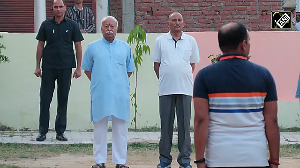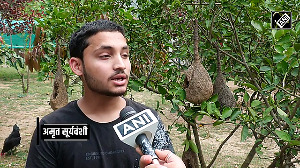Tony D'Souza, who is consolidating his reputation with The Konkans, his second novel and Ashutosh Varshney, a distinguished professor of political science are among five India-origin Guggenheim fellows for 2008 in Canada and America.
Edward Hirsch, the president of the John Simon Guggenheim Memorial Foundation, announced on April 3 that in its 84th annual competition for the United States and Canada the foundation has awarded 190 Fellowships to artists, scientists, and scholars, with awards totaling $8.2 million (Rs 32.8 crore). The successful candidates were chosen from over 2,600 applicants.
The other Indians on the list are: Chandrashekhar B. Khare, Professor of Mathematics, University of California, Los Angeles: Sumit Guha, Professor of History, Rutgers University, and Meena Alexander, Poet, and Distinguished Professor of English, Hunter College and CUNY Graduate Center, New York. Many fellows including Varshney get about $100,000 (about Rs 40 lakh).
Varshney is the first Indian American to get the prize for political science. And so would be Guha, a Cambridge University educated scholar whose history books have studied agrarian changes and ecological politics in India over the centuries.
"Indians have made excellent strides in literature and one is not surprised when they get the Guggenheim," Varshney, professor of political science University of Michigan, said, referring to winners such as Jhumpa Lahiri. "But political science dealing with India is quite another field."
His book Ethnic Conflict and Civic Life: Hindus and Muslims in India examined communal riots in certain cities in India while cities near by did not have major outbursts. Varshney argued that in a city like Baroda there was a long history of communal conflicts resulting in violent acts while in Surat the conflicts did into lead to major riots and violence. One of the reasons for the phenomenon was that some cities and much of rural India, the lives of Hindus and Muslims were intricately connected, and the desire for vengeful politics wasn't there.
'Varshney has taken us a long way in understanding intra-Indian variations in communal violence, and he leaves a set of unanswered questions for future research. What more can be asked from a work of social science?' David Laitin, Stanford University professor, mused in discussing the book
D'Souza's novel, partly inspired by the incidents in his family, is a strong indictment of the Indian Christians who allied with the Portuguese and the British.
In her recent book Quickly Changing River: Poems, Meena Alexander says she is offering a world in which the songs of a bird can become the voice of a girl in a cafe and the red juice of mulberries can be as shocking as blood.
'These are poems of rich and satisfying detail -- gingko trees and water taxis, the pearly feathers of pigeons,' wrote critic and distinguished Irish poet Eavan Boland. 'But the real strength of this book goes far beyond detail, however lyrically rendered. These poems are a sustained elegy for homelessness, for the displacement at the heart of human life. Meena Alexander is an eloquent and ambitious poet.'
Hirsch said since its establishment in 1925 the Foundation has granted more than $265 million in fellowships to almost 16,500 individuals.
Scores of Nobel, Pulitzer, and other prize winners grace the roll of Fellows, including Ansel Adams, W H Auden, Aaron Copland, Martha Graham, Langston Hughes, Vladimir Nabokov, Isamu Noguchi, Linus Pauling, Philip Roth, Paul Samuelson, Wendy Wasserstein, Derek Walcott, James Watson, and Eudora Welty.
Hirsh said Guggenheim Fellows are appointed on the basis of stellar achievement and exceptional promise for continued accomplishment One of the hallmarks of the Guggenheim Fellowship program is the diversity of its Fellows, not only in their fields of endeavour but in their geographic location and ages.






 © 2025
© 2025